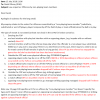So blue sub calls red manager a **** while Red striker has the ball in the penalty area correct restart PK.
So blue sub calls red manager a **** while the ball is in the centre circle its still a direct freekick but on the touchline where blue sub was standing.
If it involves spectators it would be indirect.
If it was an indirect offence it would be on the touchline nearest to the offence.
From reading this thread is what I have written right? If not kindly point out my mistake.
So blue sub calls red manager a **** while the ball is in the centre circle its still a direct freekick but on the touchline where blue sub was standing.
If it involves spectators it would be indirect.
If it was an indirect offence it would be on the touchline nearest to the offence.
From reading this thread is what I have written right? If not kindly point out my mistake.





